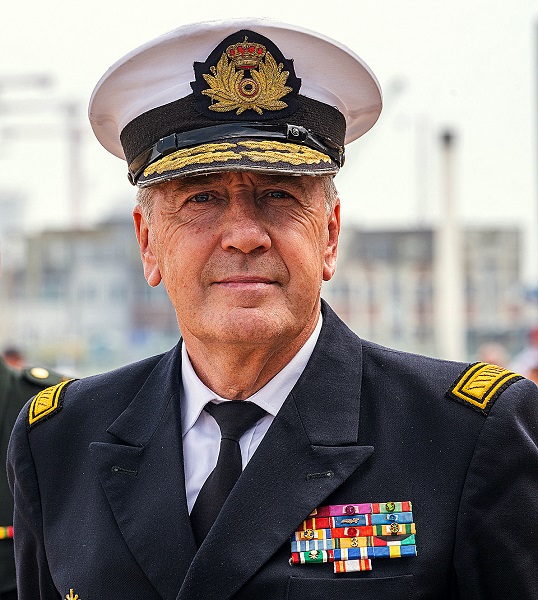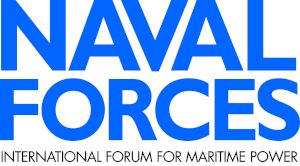Interview with Admiral Michel Hofman, outgoing Chief of Defence, Belgian Armed Forces
One 10 July 2020, Admiral Michel Hofman was named as the new Chief of Defence (CHOD) of the Belgian Armed Forces, the highest position within the national armed forces.
On 4 July 2024, Admiral Michel Hofman, handed over the helm of CHOD of the Belgian Armed Forces to Air Force General Frederik Vansina. He granted Naval Forces his final interview. A native of Oostende, Admiral Hofman completed his high school at the Royal Cadet School in Brussels and then joined the Royal Military Academy in 1978 as a candidate naval officer where he studied social and military sciences (118th all weapons class). He served in three majar campaigns: Operation “Desert Shield/Desert Storm”, Operation “Active Endeavour” and Operation ATALANTA. In autumn 1997, he joined the CHOD staff, where he contributed to the development of a strategic vision for Defence through the “Vision 2015” working group.
Interview: Guy Toremans
Photos: Belgian Naval Component/Jorn Urbain
Naval Forces: Admiral, what have been your prime concerns and top priorities when you took the helm as Chief of Defence?
Admiral Hofman: When I took office on 10 July 2020, the Belgian Armed Forces [BAF] were going through a rather turbulent period, caused by a massive loss of knowledge and experience due to the retirement wave of more than 5,000 personnel and the need to replace several outdated assets. And there were some very sensitive and challenging crises to deal with, such as, in 2021, the floods in Belgium – Wallonia and Limburg – and Operation Red Kite in Afghanistan, to name but two operations. And in February 2022 came the invasion of Ukraine which brought war to NATO’s doorstep.
Naval Forces: Russia’s attitude obviously poses a serious threat to European countries. What impact does this has on Europe’s security?
Admiral Hofman: Whereas in Ukraine Putin uses more of a conventional warfare, a so-called ‘war of attrition’, here in Europe we face a hybrid war with which he aims to undermine the cohesion between the NATO members by means of cyberattacks, sabotage and intensive disinformation operations. In fact, this cohesion already suffers from some European countries’ hesitation to continue their support to Ukraine. The West also risks losing the information war. This will certainly intensify due to the emerging and potentially disruptive technologies such as artificial intelligence.
Naval Forces: Putin appears to be preparing for more than just a war in Ukraine. In the face of this major challenge is Belgium, and Europe in general, ready to dissuade potential adversaries?
Admiral Hofman: Europe urgently needs to make it clear that it not only can defend itself but demonstrates the will to defend itself. We have to strengthen our capabilities in order to be able of anticipating and managing future crises and conflicts, and be sufficiently robust to be ready to deter potential adversaries from taking hostile actions and, if necessary, be able to counterattack.
Naval Forces: What is needed to avoid such future “interventions” by rivals?
Admiral Hofman: We must acquire the technology needed to stay at least one step ahead of rivals and potential adversaries. First and foremost, we must step up the implementation of the lessons drawn already from the war in Ukraine. The key lessons are to acquire robust air defences with an integrated air and missile defence [IAMD] capability, in electronic warfare [EW] capabilities, the integration of unmanned aerial vehicles [UAVs], unmanned surface vehicles [USV], unmannd underwater vehicles [UUV] and robotic[s]. We should invest in counter-drone systems, cyber-influence defence capabilities, and with data security becoming an ever more crucial element means to process and analyse incalculable amounts of data. In other words, acquiring a deep-strike capacity, capabilities that can counter hybrid threats and good logistic support.
Naval Forces: Russia’s aggressive attitude already prompted NATO to increase its focus on the maritime domain. How would you define the challenges Europe and NATO are facing?
Admiral Hofman: With the proliferating risk of a confrontation with Russia, NATO already increased the use of its maritime forces and elevated their operational profile, emphasizing on a presence and the monitoring of maritime activities in the North Atlantic, the Baltic Sea, the High North and the Arctic region. The Arctic countries, Canada, Norway and the United States, are already investing heavily in their surveillance capabilities to monitor these activities. But maritime situational awareness throughout these areas must be improved even further. And we also have to keep on improving our anti-submarine warfare [ASW] capabilities.
Naval Forces: Despite the tense times overhere, one sees some of the EU navies deploying assets “out-of-area”. For instance, the Italian and German Navies have assets currently deployed in the Indo-Pacific. Is it really necessary during these times to send ones asset “that far from home”?
Admiral Hofman: Security is in fact a global issue, everything is inter-connected and it is definitely the case in the maritime domain. Consequently, such deployments are certainly justifiable; they are a signal of solidarity towards our partners in the Indo-Pacific region. Such ‘out-of-area’ deployments also show that the ‘freedom of navigation’ is not an empty concept. What happens in the South China Sea, the Gulf and the Red Sea also has an impact on the EU economy.
Naval Forces: Is there a specific area of naval warfare which you feel should receive more attention?
Admiral Hofman: We must be able to cope with a new aspect of naval warfare, namely seabed warfare. We need to know what is happening underwater in order to monitor the seabed and be able to ensure the security of critical infrastructures such as the undersea communications cables and pipelines. Another aspect is to intensify maritime exercises in which high-end warfare scenarios are included and with serials that also focus on how to counter artificial intelligence and robotics.
Naval Forces: Has the war in Ukraine changed how Belgium sees its defence?
Admiral Hofman: Indeed. The sudden return of a high-intensity conflict brings us back to the concept of collective defence. We have been harvesting on the ‘peace dividend’ for too long and too deeply, due to a false perception of comfort and security. If there was little or no reaction when Putin invaded the Crimean Peninsula in 2014, that was because we did not see it coming […] or did not want to see it. Terrorist threats and other internal problems were more on the minds of politicians at the time. Today, we now realise that countries like Finland and Sweden, bordering a rather assertive neighbour, kept on preparing militarily despite their principle of neutrality. This is a good benchmark for us. The war in Ukraine instilled a sense of urgency to revamp [the BAF]. In 2022, the Belgian Ministry of Defence published the STAR Plan with recommendations and guidelines to adapt the Strategic Vision 2030 published in 2016, to meet the new challenges and be ready to cope with the threats of today and tomorrow. Our aim is to create depth and width for our armed forces by improving readiness and resilience. We have already started re-investing in equipment, personnel and infrastructure. Almost all major assets of the air, land and naval components will be replaced by new assets. Several new projects for the three components have already been initiated and we have also established a Cyber Command.
Naval Forces: Which projects are already underway?
Admiral Hofman: In terms of new capabilities, the air force can look forward to F-35A fighter aircraft and MQ-9B SkyGuardian remotely piloted aircraft systems [RPAS], and the army is to introduce new helicopters and armoured vehicles. As for the navy, this component can look forward to a completely revamped fleet, with the procurement of two [ASW] frigates, six multi-purpose vessels with specialised mine-countermeasures modules and a third coastal patrol vessel. We are also looking into the implementation of a minelaying capability, an expeditionary harbour protection capability, as well as new tactical drones to be used as advanced sensors and weapon platforms against underwater and surface threats. The NH90 helicopters will receive their [ASW capability] in 2025, and the two patrol vessels BNS Castor and BNS Pollux will undergo upgrades of their command and control capabilities. And within the Maritime Information Hub in Zeebrugge, which incorporates the Maritime Information Junction (MIK) and the Maritime Rescue and Coordination Centre (MRCC), the interdepartemental cooperation with the Federal Police, Customs and the Federal Public Service Mobility is being further enhanced.
Naval Forces: How do you see the future of Belgium and the EU within NATO?
Admiral Hofman: Given the geopolitical situation, NATO re-emphasises that its members must commit at least 2 percent of their national gross domestic product [GDP] annually on defence. Belgium as well as some other European allies do not meet this preset requirement yet. In the current situation, we need to pursue a more capable European defence. This is necessary in order to guarantee more independently security in our own periphery. The issue is to strengthen our contribution to NATO by creating as much national military capabilities as possible, jointly with the European partner countries. It is essential to have a strong European defence pillar within NATO without cutting the links with Canada and the US though. A strong Europe within NATO can only be beneficial for all partners.
Naval Forces: Can a greater collaboration with industry be beneficial?
Admiral Hofman: We must invest in the development of a European defence industrial and technological base so that European countries can can meet their own defence needs. Strengthening the link between defence and industry is needed to ensure that we can develop and supply high-quality and affordable military equipment cover our military capabilities more effectively and efficiently. The overall aim is to be able to counterbalance American upperhand and guarantee more independently security in our own periphery.
Naval Forces: Geopolitics has taken a new turn. Now it is a war of necessity. This requires a totally different approach. I suppose this will require a different mindset?
Admiral Hofman: Indeed. Raising awareness for security in the broadest sense and throughout all levels of society is a must. We need to work on a culture of readiness. Hence, personnel, equipment, infrastructure, logistics and training must be aligned to ensure that our military is ready carry out missions in a hostile environment, including high-intensity conflicts, with the necessary stocks of ammunition and equipment to sustain in the longer term.
Naval Forces: What major challenges do the BAF face, particularly in terms of new technologies that will come into service, and personnel?
Admiral Hofman: It goes without saying that the implementation of these new assets will give us a major technological leap. But this requires also specific skills which we will have to develop and acquire in order to be able to operate these new capabilities effectively. It is therefore essential to have a large and more diversified pool of well-trained personnel to operate all these new systems. Consequently, recapitalizing personnel policy is an absolute priority. Obviously, we will need personnel in sufficient numbers and with significant operational potential. Recruitment procedures will have to enable faster, more efficient and more effective active and reserve personnel joining the BAF.
Naval Forces: Belgium’s defence budget is set to increase to €6.33 billion in 2030. However, the European Commission recently imposed savings on Belgium of at least €23 billion over four or seven years to comply with EU budgetary rules. Will this compromise the defence budget and programmes?
Admiral Hofman: This is a political question. However, together with my successor, General Vansina, we have informed the next governmental team what the BAF’s needs are and that we need to speed up the strengthening of our defence in order to make it more robust and resilient. The solutions defined by the next government and the budgetary framework will of course determine the speed with which the new Defence will be able to implement the new capabilities. This will be my successor’s major challenge.
Guy Toremans is a maritime correspondent and regular contributor to Naval Forces for more than 25 years, regularly embarking on-board NATO, European, Asian, South African and Peruvian units – from aircraft carriers to submarines.






